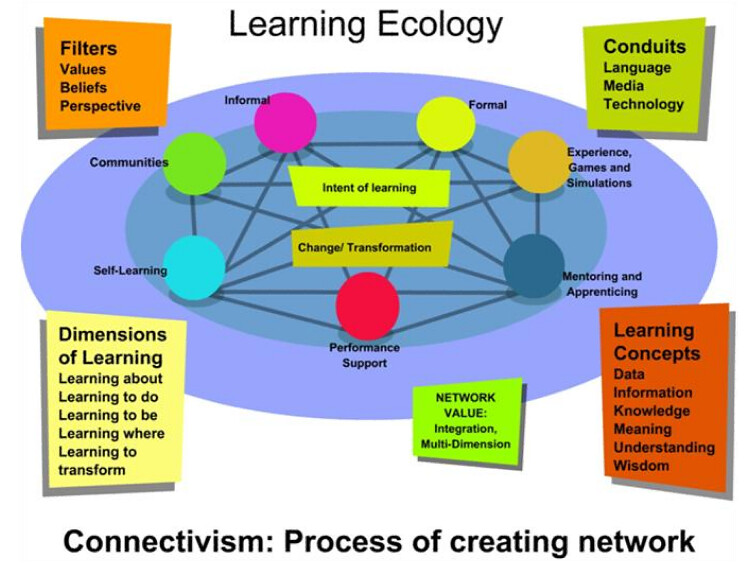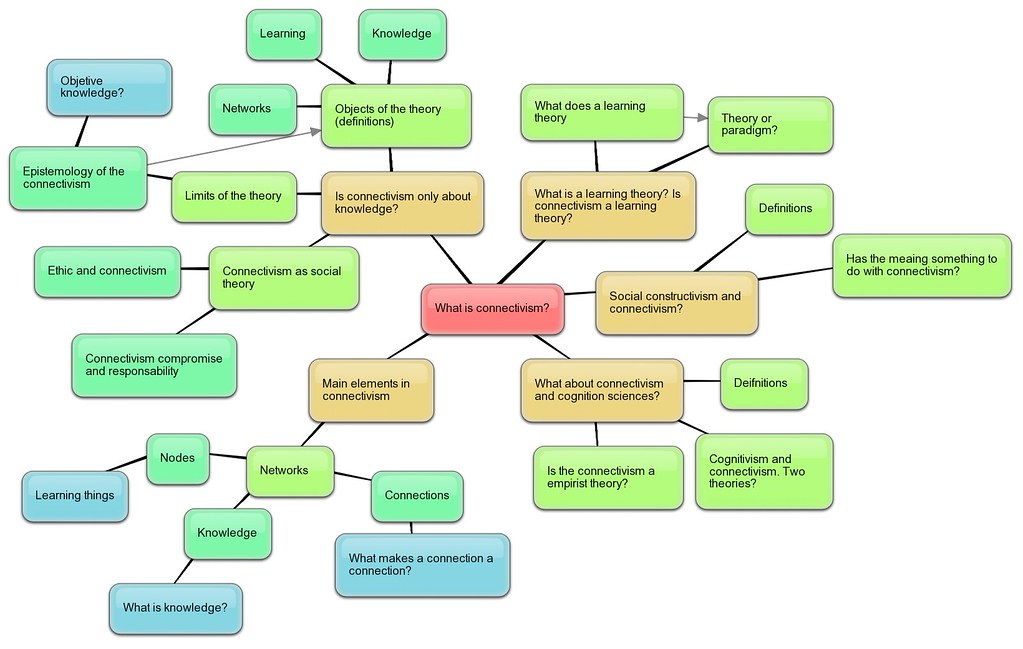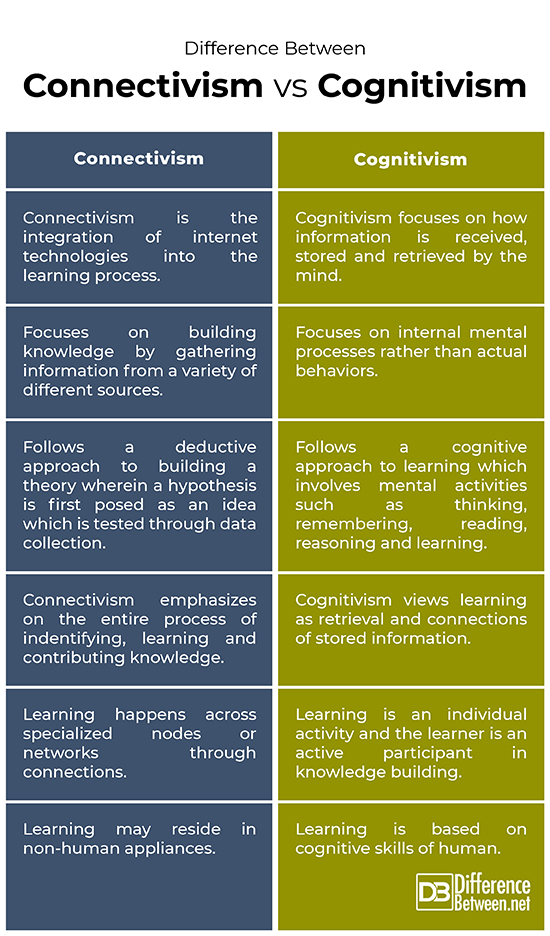Difference Between Connectivism and Cognitivism
Learning theories emerged in the 20th century with three major theoretical frameworks reshaping the whole leaning narrative: behaviorist learning theory, cognitivist learning theory and constructivist learning theory. There are referred to as traditional learning theories of the contemporary world which reflect how human study and understanding of learning have developed over the years. These theories were however, developed during the times when learning was not impacted by technology. Over the last few decades, technology has revolutionized the way we live, communicate and learn. The Internet has changed everything. It changes the essential nature of knowledge with alternative theory called Connectivism, which is cited as the learning theory of the digital age.

What is Connectivism?
Connectivism is the theory of digital age that aids in learning. Connectivism is the integration of internet technologies into the learning process. Siemens describes Connectivism as, “the model of learning for the digital age where learning is no longer an internal, individualistic activity, which manifests itself in all aspects of human life.” It is a learning theory that is required as a response to digital and networked technologies. Connectivism is based on the idea of knowledge sharing and learning via the internet using technologies such as email, web browser, social networks, video conferencing, community forums, etc. Connectivism is connecting people through shared learning. It is a theoretical framework to understand learning; in fact, Connectivism is closely linked to the idea of networked learning wherein learning can happen across peer networks that take place online. Simply put, Connectivism is a learning theory that creates new learning opportunities for individuals across the World Wide Web using modern-day digital technologies.

What is Cognitivism?
Cognitivism is a traditional learning theory which reflects one of the many different phases of the learning process. Cognitivism recognizes the significance of mind in making sense of the outside world. Unlike Connectivism, Cognitivism focuses on how information is received, stored and retrieved by the mind. It sees the mind as an information processor just like a computer and views knowledge as schema. Behaviorism views mind as a big black box and Cognitivism seeks what is inside the black box of the mind. It is concerned with technology that could model the mind and represent knowledge. Cognitivism is often used in developing classroom lessons and assisting students to learn higher-order thinking skills. It involves the study of mental responses rather than actual behaviors.
Difference between Connectivism and Cognitivism
Theory
– Connectivism is a learning theory that is required as a response to digital and networked technologies and is based on the idea of learning and knowledge sharing in the digital age. It focuses on building knowledge by gathering information from a variety of different sources. Cognitivism, on the other hand, focuses on internal mental processes rather than actual behaviors and recognizes the significance of mind in making sense of the outside world. It is concerned with technology that could model the mind and represent knowledge.
Approach
– Connectivism represents a deductive approach to building a theory wherein a hypothesis is first posed as an idea which is then put under testing through data collection. This is informally called a top-down approach. It is based on the concept of network-organized learning meaning learning can be achieved under a networked environment without instructors and course structure. Cognitivism, on the other hand, refers to a cognitive approach to learning which involves mental activities such as thinking, remembering, reading, reasoning and learning. These cognitive skills are responsible for acquiring, processing, storing and retrieving information.
Learning Structure
– Connectivism is a learning theory that creates new learning opportunities for individuals across the World Wide Web using modern-day digital technologies. Rather than acquiring knowledge in the traditional sense, Connectivism emphasizes on the entire process of indentifying, learning and contributing knowledge. Cognitivism, on the other hand, focuses more on the inner process of learning and views learning as retrieval and connections of stored information. It believes learning is a proactive exploration of the learner who seeks to build his knowledge structure.
Difference between Connectivism VS. Cognitivism

Summary of Difference between Connectivism VS. Cognitivism
The field of learning theory is extensive and well developed so we have only focuses on the areas that have had a direct impact on the research in learning. Cognitivism is referred to as a traditional theory of learning which recognizes the importance of human mind in building knowledge. It is a broad learning theory often utilized in the creation of instructional environments. However, the theory of Cognitivism was developed during a period of time when technology has no impact on learning. This changed with the proliferation of internet which changed the way we learn. As a result a new alternative learning theory called Connectivism was borne, which was the only learning theory of the digital age.
- Difference Between Caucus and Primary - June 18, 2024
- Difference Between PPO and POS - May 30, 2024
- Difference Between RFID and NFC - May 28, 2024
Search DifferenceBetween.net :
Leave a Response
References :
[0]Ntalianis, Klimis et al. ECEL 2018 17th European Conference on e-Learning. Oxfordshire, England: Academic Conferences and Publishing International, 2018. Print
[1]Harasim, Linda. Learning Theory and Online Technologies. Abingdon, United Kingdom: Routledge, 2012. Print
[2]Jones, Christopher. Networked Learning: An Educational Paradigm for the Age of Digital Networks. Berlin, Germany: Springer, 2015. Print
[3]Harasim, Linda. Learning Theory and Online Technologies. Abingdon, United Kingdom: Taylor & Francis, 2017. Print
[4]Zheng, Qinhua. The Development of MOOCs in China. Berlin, Germany: Springer, 2017. Print
[5]Image credit: https://live.staticflickr.com/184/436318573_e191e4976b_c.jpg
[6]Image credit: https://live.staticflickr.com/3045/2860177658_0c9ddbdcc0_b.jpg
